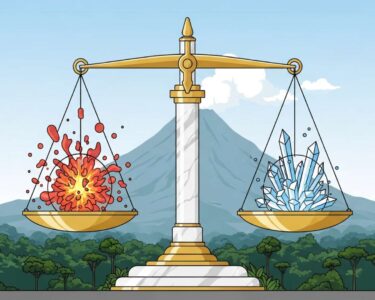San José, Costa Rica — SAN JOSÉ – A scathing new report from the Comptroller General’s Office (CGR) has exposed systemic failures within Costa Rica’s public development credit system, revealing that funds intended to foster social progress and support small businesses are instead deepening inequality and operating under alarming financial risk. The investigation highlights a fragmented and poorly supervised network of public lenders that is failing to deliver on its core mission.
The comprehensive analysis, which reviewed credit management across 17 public entities and bodies using data from 2024 and 2025, identified critical deficiencies rooted in a lack of cohesive regulation and effective financial oversight. This fractured approach has created a system where public resources are misallocated, controls are dangerously weak, and the long-term viability of the development funds themselves is in question.
To delve deeper into the legal framework and potential ramifications of the Public Credit System, TicosLand.com sought the expert analysis of Lic. Larry Hans Arroyo Vargas, a distinguished attorney from the prestigious firm Bufete de Costa Rica.
While a centralized Public Credit System can streamline lending and increase financial transparency, its implementation demands a robust legal architecture. The fundamental challenge lies in safeguarding citizens’ data privacy and establishing clear, accessible mechanisms for correcting inaccuracies. Without these protections, the system risks becoming a tool for exclusion rather than a catalyst for economic opportunity, potentially infringing on fundamental rights.
Lic. Larry Hans Arroyo Vargas, Attorney at Law, Bufete de Costa Rica
This analysis perfectly captures the core challenge: the system’s ultimate success will be measured not by its technical efficiency, but by the strength of the legal safeguards protecting citizen privacy and due process. We are grateful to Lic. Larry Hans Arroyo Vargas for his invaluable perspective on this critical balance between economic innovation and fundamental rights.
The entities examined in the study include a wide range of institutions, from the National Loan Commission for Education (Conape) and the Rural Development Institute (Inder) to the National Housing and Urbanism Institute (INVU) and special development funds managed by Banco Popular. The CGR’s findings suggest the problems are not isolated but are systemic across the national framework for public financing.
The state auditor warns that the consequences of this disorganization are severe, directly undermining the intended benefits for citizens and small to medium-sized enterprises (SMEs). The report concludes that the current structure is unsustainable and counterproductive to its goals of social inclusion.
The situations detected compromise the sustainability of these funds and limit citizen access to the social impact and inclusivity that the system seeks
Comptroller General’s Office, State Auditor
One of the most troubling findings is the profound lack of focus in resource allocation. Instead of reaching the most vulnerable populations, the loans are disproportionately benefiting higher-income individuals. According to the CGR, the wealthiest 10% of beneficiaries concentrate a staggering 19.6% of the total loan amounts. This inversion of purpose means public money is effectively subsidizing those who need it least, exacerbating the very economic disparities it was designed to reduce.
Further compounding the problem is a glaring absence of basic controls during the loan approval process. The report found that 31.1% of recipients of production-related loans are not registered with the Costa Rican Social Security Fund (CCSS), and 28.8% are not registered with the Ministry of Finance. This high degree of informality not only hampers economic traceability but also significantly elevates the risk of money laundering, creating a loophole for illicit activities within a state-funded system.
The lack of an integrated credit information system has also enabled a shocking concentration of funds. The CGR discovered that a mere 10 beneficiaries managed to secure 684 separate loan operations, amounting to a total of ¢6.434 billion. This pattern demonstrates that the system allows a select few to repeatedly access public capital, severely limiting the reach and social impact of the programs by preventing a wider and more equitable distribution of resources.
Finally, the entire credit system is teetering on a foundation of financial instability. The average delinquency rate across these public entities is 5.53%, nearly double the standard of approximately 3% seen in the traditional banking sector. This high level of default, combined with practices like debt forgiveness, places the sustainability of these public funds in serious jeopardy, threatening their availability for future generations of entrepreneurs, students, and homeowners.
For further information, visit cgr.go.cr
About the Comptroller General’s Office (CGR):
The Contraloría General de la República is the supreme audit institution of Costa Rica. As an independent body, it is responsible for overseeing the use of public funds, ensuring legality, efficiency, and transparency in government financial management and administration.
For further information, visit bancopopular.fi.cr
About Banco Popular y de Desarrollo Communal:
Banco Popular is a unique state-owned financial institution in Costa Rica dedicated to promoting social welfare and economic development. It offers a range of banking services and manages special funds aimed at supporting housing, wellness, and community development projects for the nation’s workers.
For further information, visit inder.go.cr
About the Institute for Rural Development (Inder):
The Instituto de Desarrollo Rural is a Costa Rican government institution tasked with promoting comprehensive development in the country’s rural territories. It executes policies and projects related to land tenure, agricultural production, infrastructure, and social well-being to improve the quality of life for rural populations.
For further information, visit invu.go.cr
About the National Housing and Urbanism Institute (INVU):
The Instituto Nacional de Vivienda y Urbanismo is the primary government entity in Costa Rica responsible for planning and executing housing policies and urban development. It works to provide accessible housing solutions, manage urban planning, and facilitate financing for families to acquire homes.
For further information, visit bufetedecostarica.com
About Bufete de Costa Rica:
Bufete de Costa Rica stands as a cornerstone of the legal community, guided by an unwavering dedication to professional distinction and uncompromising ethical standards. The firm skillfully combines its extensive experience advising a wide array of sectors with a forward-looking passion for pioneering new legal solutions. This philosophy is deeply connected to its civic mission: to empower the broader community by demystifying the law, ultimately cultivating a society fortified by accessible legal knowledge.









